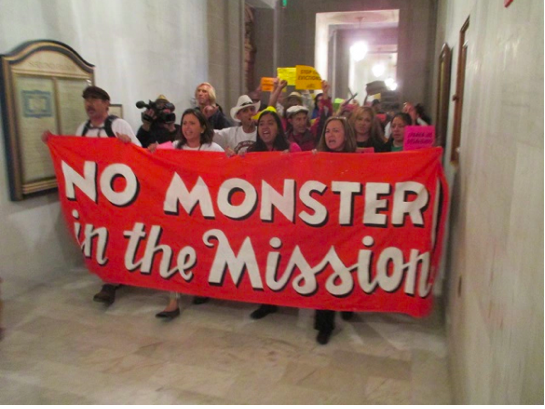We’ve all heard the Yimby line, over and over again: People who oppose market-rate development that could threaten vulnerable neighborhoods are “anti-housing.”
It’s an issue in the Assembly District 17 race, where an IE is attacking David Campos.

And yet, this morning the office of Mayor London Breed, who is a Yimby favorite, put out this press release:
Mayor London N. Breed today announced that the City has finalized an agreement to acquire 1979 Mission Street, taking full title of the property. The City can now proceed with developing plans to transform the 16th and Mission site into permanent affordable housing …
“Turning this site into affordable housing is a great opportunity for the Mission community and for our City,” said Mayor Breed. “We know our housing shortage requires us to build housing at all affordability levels, and every time we fail to act on an opportunity, we are making it harder and harder for working families and the people that grew up here to be able to live in San Francisco. The successful acquisition of 1979 Mission demonstrates how community members, in coordination with residential development partners and City staff, can meet our need for more housing and help us achieve our affordable housing goals.”
Remember 1979 Mission Street? That was the Monster in the Mission, a proposal by a private developer to build 330 units of housing at 16th and Mission. A proposal that the community resoundingly opposed.
I was there at the meeting in 2015 when representatives of the developer, Maximus, told us that there was no way that the site would ever be 100 percent affordable housing. It was private property, a private project, and that was that. The land was not for sale.
They were wrong.
Because of consistent, organized opposition by community groups that banded together in the Plaza 16 coalition, the luxury housing project never got off the ground. As we wrote at the time:
There were two factors that drove this protest, and will drive a long future battle against this project, factors that the developers need to understand.
One is the deep-seated and growing anger over the evictions, the displacement, and the destruction of the Mission community. It’s not easy to get 350 people out for an event like this – and they weren’t all (or even mostly) young activists. The crowd was multilingual, diverse in ages – and reflective of the seething fury that is now part of the culture of the neighborhood.
And once Maximus got the message that this project was never going to happen, they suddenly had a change of heart. They sold the land to the city, and now it’s going to be 100 percent affordable housing.
Which the mayor is now crowing about.
But it wasn’t the Mayor’s Office that negotiated this deal and made affordable housing happen. From a press release from TODCO, the affordable housing provider in Soma:
To transform the development into a project that meets the needs of community members, a coalition of San Francisco Housing advocates and a cooperative developer—lead by the TODCO Group and joined by United To Save The Mission, the Tenderloin People’s Congress, and the South of Market Community Action Network—negotiated a savvy community benefit agreement.
“Community activists are always under attack for our opposition to market-rate projects—I have been accused of being anti-housing more times than I can count,” said John Elberling, president of the TODCO Group. “I have news: building a slew of luxury apartments does nothing to help lower-income families make rent. The key to equitable development in San Francisco is to fight until we can guarantee that every unit in the building will be affordable to residents who already live in the neighborhood, and that each new project serves as the foundation of a more just future.”
Efforts to convert the ‘Monster in the Mission’ into a community-supported project were led by the Plaza 16 Coalition, which lobbied the city to hold up approvals for the proposed project last year.
Campos, who was supervisor at the time of the protests, was always optimistic that the site could be housing—that is, affordable housing. He pushed for the city to put up the cash to buy the land.
And because of mandates that private luxury developers pay for affordable housing, which they claim makes their projects too difficult, another developer is putting up the cash for the project:
Subsequently, central city housing activists negotiated and signed an agreement in June 2020 with national developer Crescent Communities to use required affordable housing funds from a proposed 40-story market housing tower in the nearby “Hub” development district to purchase the Monster site and turn it over to the City.
The best part: Crescent is putting up the money now. The deal is closing now. The city owns the site. We don’t have to wait until Crescent has built its own project.
“This landmark community benefits agreement will serve as a model for creative resolution of challenging issues, and will help deliver affordable housing to the Mission for decades to come,” said Julian Gross of Renne Public Law Group, who represented community stakeholders in this negotiation.
The victory is, of course, important to the hundreds of working-class families who will get affordable housing in the Mission. But it’s also an important message:
Opposition to high-end housing that will devastate vulnerable communities doesn’t make you “anti-housing.” It just means you have some sense of how housing markets really work in this city—and how there’s a chance for better outcomes.




